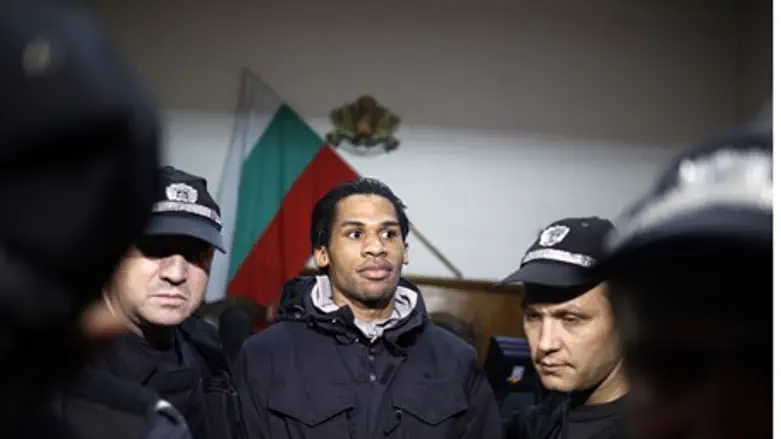
France arrested five Russians Tuesday accused of plotting a new attack as four men suspected of helping the gunmen behind the Paris shootings were brought before anti-terrorist judge.
European nations, on high alert after the attacks that shook France to its core, have launched a wave of raids targeting suspected jihadist cells.
French prosecutors said five Russians from the restive Muslim republic of Chechnya had been detained near the southern city of Montpellier suspected of plotting an attack.
No further details about their plans were immediately available.
Counter-terrorism experts have warned that "thousands" of Russian-speaking Muslims from former Soviet Central Asian countries have joined ISIS - at least some of whom have returned home.
Meanwhile, prosecutors have called for charges against four men suspected of helping supply weapons and vehicles to the Islamist gunmen who killed 17 people in three days of carnage around Paris.
The four, who are appearing before a anti-terrorist judge, would be the first to face charges over the January 7-9 terrorist attacks, the worst in France in decades.
There has been a flurry of activity by police and prosecutors across a jittery Europe, including raids by some 200 German police hunting a jihadist network they believed was planning an attack in Syria.
The Germans searched 13 apartments in Berlin and other locations, seeking people linked to the alleged leader and financier of the group who had been detained on Friday.
Greece also ordered the extradition of a 33-year-old Algerian man with suspected links to yet another jihadist cell dismantled by Belgian security forces last week over claims it was plotting to kill police officers.
The suspect, who has said he is willing to be sent to Belgium because he wants to prove his innocence, will be extradited later Tuesday or Wednesday, according to a Belgian security source.
The man was arrested in Athens on Saturday, two days after Belgian police had carried out a raid in the eastern town of Verviers and shot dead two suspects.
Belgian investigators believe the group were preparing to attack police officers and police stations in Belgium.
According to police, the suspect in Athens has served a jail term in Greece for a robbery conviction but was released nearly a year ago Another man who was arrested with him in the Greek capital was released.
The suspected mastermind of the plot, Abdelhamid Abaaoud, a 27-year-old Belgian of Moroccan descent, remains at large.
And in Bulgaria, a court ruled that a Frenchman who knew two of the Paris attackers should be returned to his home country.
France had issued an arrest warrant for Muslim convert Fritz-Joly Joachin, 29, who denies being an extremist but was detained after trying to cross from Bulgaria into Turkey before the attacks.
France's 'ethnic apartheid'
The jihadist attacks in Paris on satirical magazine Charlie Hebdo and a kosher supermarket and police officers triggered global outrage and fears of a resurgence of Islamist terrorist attacks in Europe.
A Muslim employee in the Jewish supermarket, who was hailed as a hero for trying to save customers during the attack in which four people were killed, was set to gain French citizenship on Tuesday.
About 273,000 people had signed a petition calling for France to naturalize Lassana Bathily, 24, from Mali.
The attacks have forced France to face up to its failure to integrate poorer, migrant families, with Prime Minister Manuel Valls admitting on Tuesday that the country suffered "social and ethnic apartheid".
He also sought to douse the anger sweeping many Muslim countries after Charlie Hebdo once again published a cartoon of the founder of Islam Mohammed on its cover.
Responding to the murder of eight of its journalists by the jihadists, it featured Mohammed crying, under the headline "All is forgiven".
President Francois Hollande insisted his country "insults no one when we defend our ideas, when we proclaim freedom".
But Valls sought to nuance the message, saying "'Je suis Charlie' is not our only message to the world.
"France carries freedom of expression everywhere, but it also defends other values it holds dear: peace, respect for beliefs, dialogue between religions," he said.
His words followed giant anti-Charlie Hebdo marches in a number of Muslim countries.
Several hundred thousand people marched in Chechnya on Monday. Authorities in the tightly-controlled region said more than one million people - almost the entire population of the republic - took part.
Thousands also rallied on Monday in Afghanistan, Gaza, Iran and Pakistan, with many burning French flags and threatening attacks against France.
Europe has seen its own rallies, with anti-Islamic groups and anti-racist groups trying to out-number each other.
The Danish wing of Germany's anti-Islamic PEGIDA movement staged its first rallies on Monday, drawing several hundred people in the capital and other cities, but was outnumbered by counter-demonstrators.
In Germany, too, more than 17,000 anti-racism demonstrators took to the streets across the country on Monday in opposition to PEGIDA, which had been forced to cancel its own rally following a terrorist threat.
